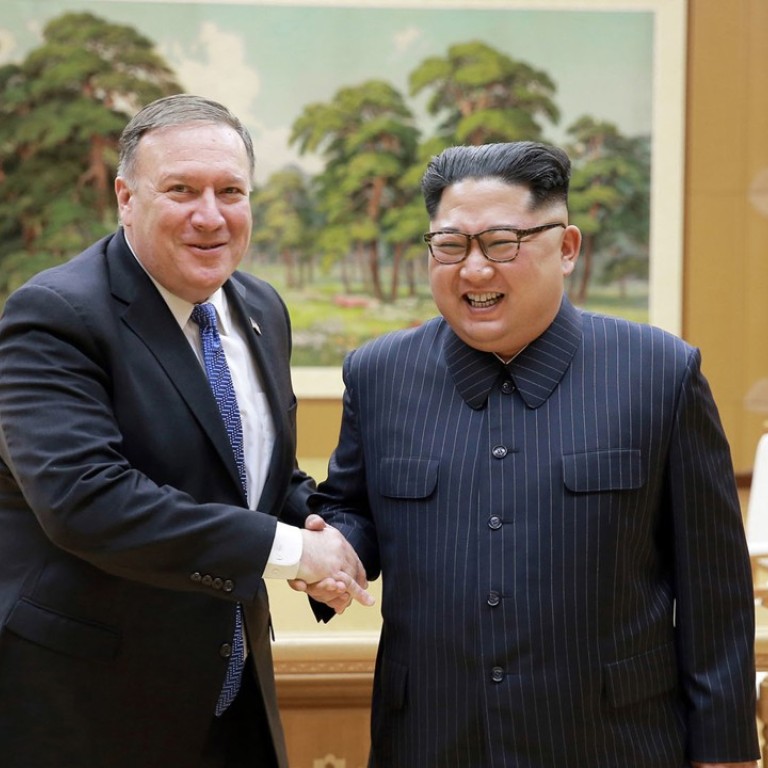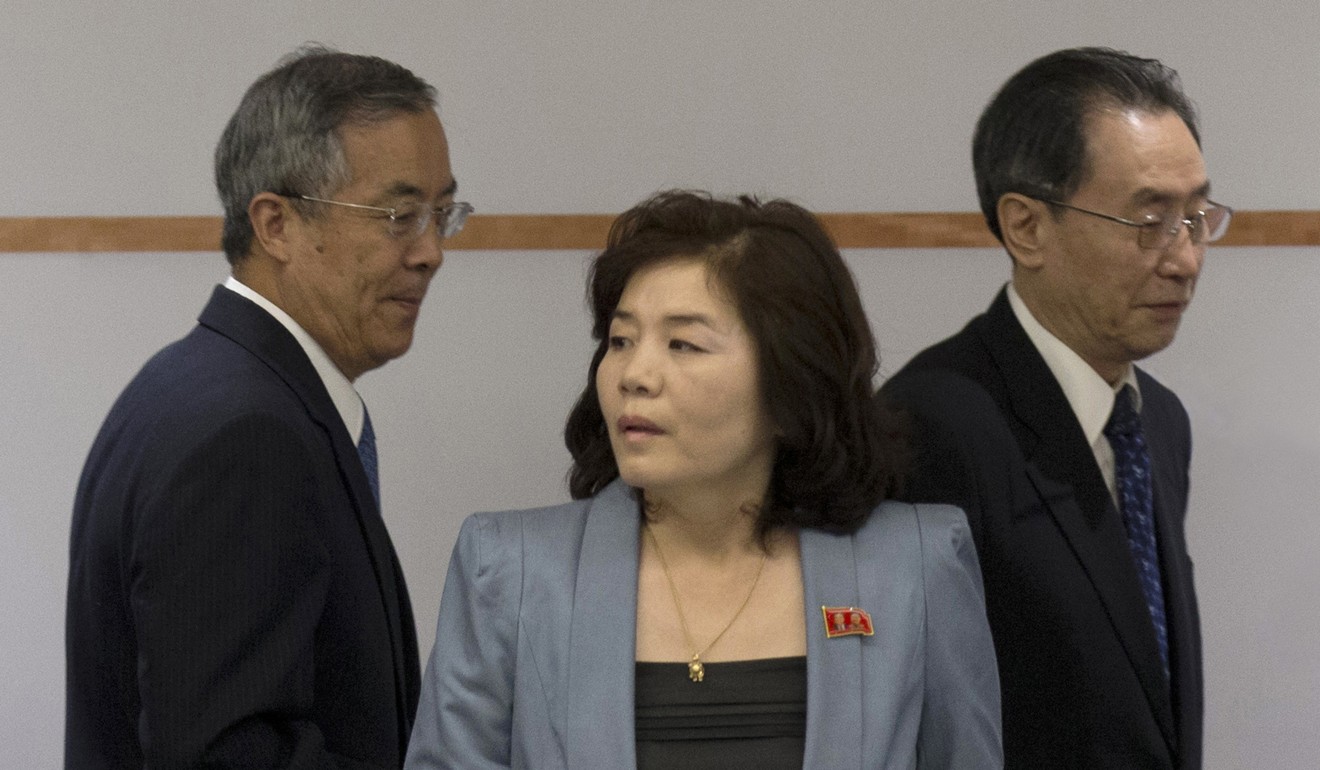
Vienna, home to UN nuclear watchdog agency, may hold key to US-North Korea deal
Diplomats and experts in nuclear policy are already based in the Austrian capital, which could offer a platform to advance the stalled talks
The road to the “rapid denuclearisation” of North Korea could run through Vienna, former senior US diplomats involved in nuclear policy believe.
As part of his efforts to “mark the beginning of negotiations to transform” relations, US Secretary of State Mike Pompeo last month invited North Korean representatives to meet his special envoy, Stephen Biegun, in Vienna – home to the UN’s nuclear weapon watchdog agency – “at the earliest opportunity”.
Washington’s eagerness for a Vienna dialogue comes after several Korea hands in Washington cast doubt on the Trump administration’s approach.
Watch: North Korea’s Kim may have up to 60 nuclear warheads
The US is demanding the complete, verifiable, irreversible dismantling of North Korea’s nuclear weapons programmes, and says sanctions will remain until that happens.
Last week the UN General Assembly meetings, North Korean Foreign Minister Ri Yong-ho criticised that approach.
“The problem is that the continued sanctions are deepening our mistrust,” he said.
A commentary carried by North Korea’s official news agency on Tuesday suggested that Washington should lift sanctions; formally declare an end to the Korean war, which was halted by an armistice in 1953; and build mutual trust.
The US State Department has yet to announce any travels by Biegun to Vienna, where the International Atomic Energy Agency (IAEA) is based.
The envoy told the South Korean Yonhap news agency on Tuesday that he would accompany Pompeo to Pyongyang this weekend. It is a trip Pompeo described on Wednesday as “another chance to continue to advance the commitment” and “build out a pathway for denuclearisation”.
Thomas Countryman, former assistant secretary of state for international security and non-proliferation from 2011 to 2017, said that Biegun’s future travel to Vienna “represents an opportunity for the two sides to work on these extremely complex issues and to make the kind of detailed agreement that will move us forward”.
Watch: Second Kim summit coming soon, Trump says
After US President Donald Trump made the North Korean nuclear threat a top priority last year, Washington began diplomatic communication with Pyongyang through two major channels: official talks in New York and unofficial dialogues in third countries.
The former, known as the New York channel, is facilitated by North Korea’s mission to the United Nations headquarters, in the absence of formal ties between the two countries.
Through this channel, Pompeo met North Korean leader Kim Jong-un’s right-hand man, Kim Yong-chol, in May and foreign minister Ri last month.
The latter channel, also called the Track 1.5 diplomacy, is used by American civil nuclear experts acting on behalf of the US government and North Korean diplomats in foreign territories.
Suzanne DiMaggio conducted such back-channel dialogue on behalf of the US with senior North Korean diplomat Choe Son-hui in May 2017 in Oslo, Norway.
DiMaggio later told the South China Morning Post that the North Koreans were considering re-engaging in nuclear talks with the US.

Choe, who is now North Korea’s vice-minister of foreign affairs, said the same, telling reporters in Beijing during her transit back to Pyongyang from Oslo: “If conditions are met, we will hold dialogue” with the US.
Countryman said the New York channel and Track 1.5 diplomacy were primarily for communications, not negotiations.
“The New York channel is essentially for passing messages,” he said, adding: “Track 1.5 involves non-government officials from the US side, and therefore that’s not a point at which you can have negotiations on the key issues that are separating North Korea and the US.”
Now it could be Vienna’s turn to serve as a platform to advance the stalled talks.
Laura Holgate, US ambassador to the Vienna office of the United Nations and the IAEA from 2016 to 2017, said: “I would certainly suggest that the North Korean diplomats who are based in Vienna are very well familiar with the details of [their country’s] nuclear file”.
North Korea maintains an embassy in Vienna. Kim Kwang-sop, the current North Korean ambassador, represents Pyongyang’s interests to the United Nations and other international organisations based in the Austrian capital.
Holgate, now a vice-president of the Washington-based non-profit Nuclear Threat Initiative, said she hoped Biegun would “take advantage of being there to spend some time with the IAEA” to understand the scope and limit of the agency’s capacities for supervising a possible denuclearisation deal.
North Korea joined the IAEA in 1974 but withdrew its membership in 1994.
The IAEA gained access to North Korea’s Yongbyon nuclear facilities and conducted inspection and verification visits amid the six-party denuclearisation talks that began in 2003.
But in April 2009, under the rule of Kim Jong-un’s father, Kim Jong-il, Pyongyang ceased cooperation with the agency, removing all IAEA seals from the Yongbyon facility and switching off surveillance cameras. IAEA inspectors subsequently left the country.
The following month, Pyongyang conducted an underground nuclear test at its Punggye-ri site, the same location where it claimed to have tested a hydrogen bomb on September 3, 2017.
In early June, as tensions on the peninsula begun to thaw after two inter-Korea summits and before the Kim-Trump meeting in Singapore, the director general of the IAEA told the agency’s board that it was ready to resume nuclear verification activities in North Korea if circumstances allowed.
“We continue to enhance our readiness to play an essential role in verifying the DPRK’s nuclear programme if a political agreement is reached among countries concerned,” Yukiya Amano said.
IAEA spokesman Fredrik Dahl said the agency had been closely following developments since the Trump-Kim summit in June.
“As verification and monitoring activities in [North Korea] would be a priority for the IAEA,” Dahl said, it “has already trained a significant number of IAEA inspectors for this purpose, and continues to do so.”
He did not say whether the agency has maintained any contact with North Korean diplomats based in Vienna over the nuclear issue.
Holgate cautioned that the IAEA needed to design “an alternative verification process” for North Korea.
She referred to a so-called South African model of denuclearisation, which would require “a unilateral elimination of the weapons themselves before the IAEA got involved”. But given the size and scope of North Korea's nuclear programme, she said, that model would not be appropriate for Pyongyang.
“The IAEA could apply standard safeguards techniques to monitoring or destroying nuclear materials and facilities,” Holgate said.
She added: “I think it will be important for the people negotiating the deal to be really familiar with the limits of what IAEA can do when it comes to weapons themselves.”

